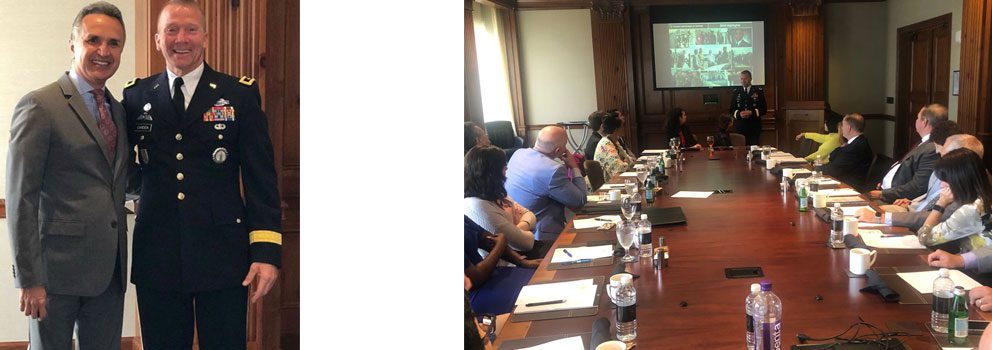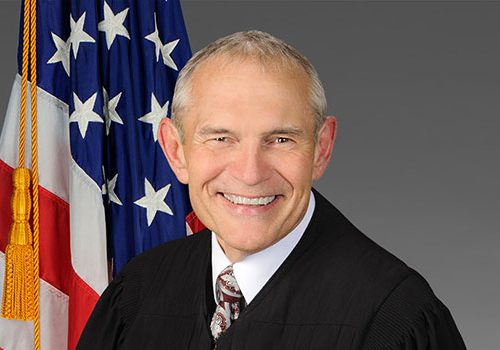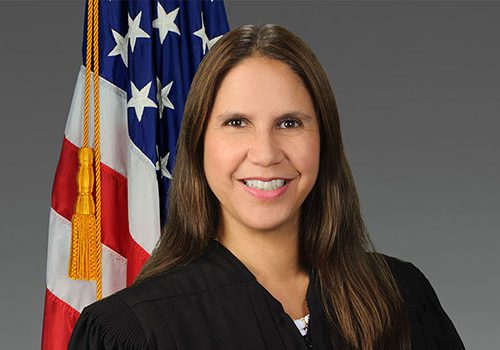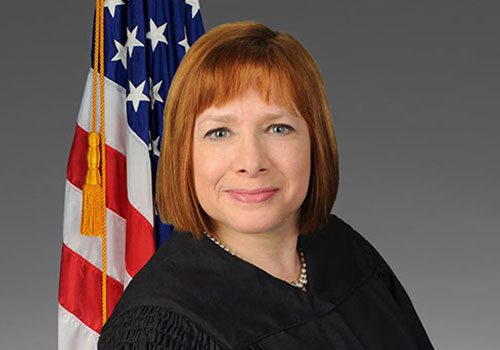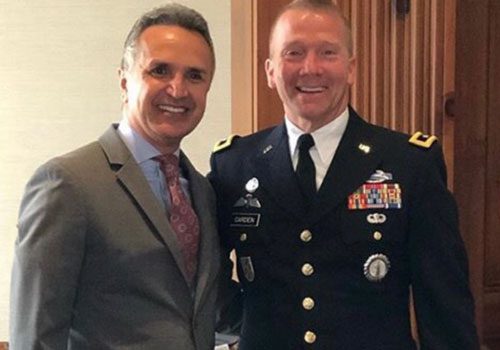Author: Georgia Office of State Administrative Hearings
03 Jan Meet Our Judges – Steven Teate
The Honorable Steven Teate
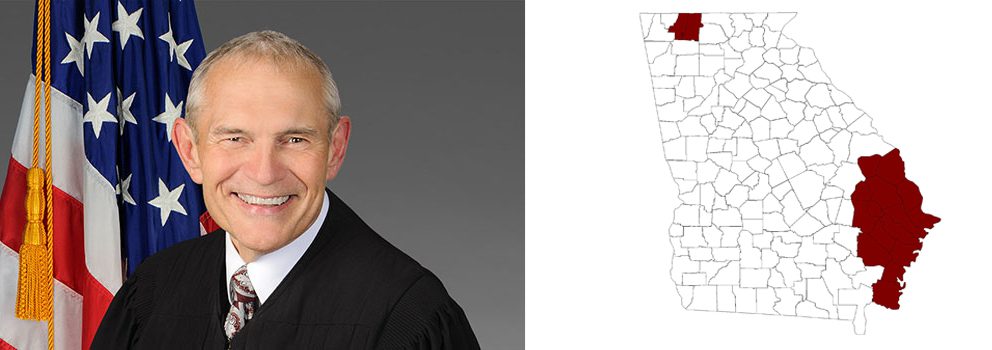
Appointed to the Court:
1995
Counties Covered:
Northern Circuit: Murry and Whitfield
Southern Circuit: Bryan, Bulloch, Camden, Candler, Chatham, Effingham, Evans, Glynn, Jenkins, Liberty, Long, McIntosh, Screven, Tattnall, and Wayne
Education:
Bachelor of Arts: History – University of Georgia
Juris Doctorate – Cumberland School of Law, Samford University (J.D. requirements for Samford completed at Emory University School of Law)
Hometown:
Bowdon, Georgia
One Of OSAH’s Longest-Serving Judges
Judge Steven Teate is one of OSAH’s original and longest-serving judges. Prior to joining Georgia’s Administrative Court, Judge Teate worked in private practice and then with a small law firm. He later worked as a hearing officer for the former Office of State Administrative Appeals (Georgia Department of Human Resources) from October 1, 1993, to April 1, 1995. While there, he primarily conducted administrative hearings for cases referred by Child Support Enforcement.
Judge Teate joined OSAH when it was formed in April 1995. “I’ve always been happy to work here and am happy to continue to work here,” he said. Today, he conducts and decides contested administrative cases referred by various state agencies.
One of Judge Teate’s favorite aspects of being a Judge at OSAH is the broad range of cases over which he presides: “The range of cases has always been an attraction for me because it allows me to cover a lot of areas of the law that I may not have otherwise been exposed to.” Judge Teate added that he loves the diversity of the people he meets as he presides over cases across Georgia. “From populous areas like Savannah to smaller towns like Hinesville, each one has its own distinct characteristics, and I truly enjoy that diversity,” he said.
Advice On How To Prepare For A Hearing
According to Judge Teate, one of the most challenging aspects of his job is uninformed parties. “It’s challenging when the litigants are poorly informed and rely on false assumptions,” he said. As a result, Judge Teate recommends that all litigants, including those representing themselves, actively research and obtain pertinent information relevant to their cases.
For example, Judge Teate recommends that parties access the website of the opposing agency and carefully read any regulations relevant to their cases. If a party is unable to access the internet, Judge Teate encourages them to directly contact the agency and ask for a copy of the regulations upon which the agency based its decision. According to Judge Teate, “The better parties understand the rules and regulations they are disputing, the stronger their arguments.”
Judge Teate’s words of judicial wisdom also extend to lawyers who appear before him. In addition to knowing the relevant rules and regulations, he advises that lawyers focus on the law and advocate for their clients within that perspective. Judge Teate said, “When all participants are informed, the Court is better informed, and it assists the Judge in making the best possible decision.”
A Passion For Sharing Knowledge
Judge Teate is passionate about helping others in the legal community and has participated in several professional associations, including the Administrative Law Section of the State Bar of Georgia, the Georgia Association of Administrative Judiciary (GAAJ), the National Association of Administrative Law Judges (NAALJ), and Stonewall Bar Association. He also served as president of GAAJ in 2003 and as an Executive committee member of GAAJ in 2004.
In addition to devoting his time to the judicial community, Judge Teate is active in the academic community. He has taught master’s-level administrative law courses at Kennesaw State University as well as administrative, tort, debtor-creditor, and research courses in the Paralegal Certificate Program at Emory University.
Judge Teate finds teaching “incredibly rewarding and enjoyable because most of the people there are motivated to be there. They want the knowledge you have, and teaching helps me focus and stay current on those laws.” And Emory has a special place in his heart, as he worked as a computer operator at Emory’s hospital both before and during law school.
Early Career Experiences
Before embarking upon his legal journey, Judge Teate worked as a forklift and computer operator at Southwire in Carrollton, as well as an orderly (now called a nursing assistant) at hospitals in Bowdon and Carrollton. Today, those jobs help guide how Judge Teate approaches deciding his cases. “I always try to be rational and exercise compassion as I make legal decisions,” he said. He particularly credits his time as an orderly and his work experience at the hospitals for developing his sense of compassion: “You develop compassion for others because you are dealing with them on a very fundamental level,” he said.
Finding Balance Off The Bench
Finding balance off the bench is something Judge Teate works hard at – literally. Almost every morning, you can find him at the gym by 5 a.m. According to Judge Teate, “Exercise helps me focus and stay physically and mentally centered. If I’m out of balance, exercise helps me fix it.”
Judge Teate also enjoys traveling to culturally diverse and artistic locations. A few of his favorite international destinations include Tuscany and the south of Spain. Domestically, he loves visiting San Francisco, New York City, San Diego, Seattle, Portland, and Boston, as well as various national and state parks for hiking.
Family Is Everything
This Georgia native never loses sight of home or family. When he’s not traveling for work or to “bucket list” destinations, he enjoys spending time with his partner of 37 years and his cat, as well as further travel to spend time with his two sons, three grandsons, a granddaughter, and a great-grandson who are somewhat scattered over the North American continent. He says the accomplishments he’s most proud of are the relationships he’s fostered with his family and friends through the years.
12 Nov Meet Our Judges – Ana Kennedy
The Honorable Ana Kennedy
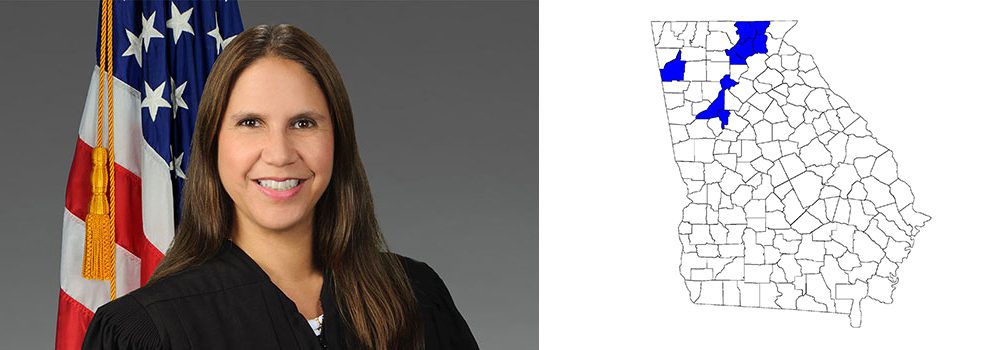
Appointed to the Court:
2002
Counties Covered:
Clayton, Dawson, Floyd, Fulton, Lumpkin, Towns, Union, and White
Education:
Bachelor of Science: Political Science – University of Florida
Juris Doctorate – Georgia State University College of Law
Hometown:
Red Bank, New Jersey
For Judge Kennedy, her career as an attorney and Judge has always been about helping others and making a positive and meaningful difference in her community. Judge Kennedy joined the Georgia Administrative Court in 2002 after serving as counsel with the Atlanta Legal Aid Society (ALAS) for five years. But even before her legal career launched, a strong foundation had been laid for a life in public service.
Encyclopedias & “Matlock” Ignite A Love For The Law
At seven years old, Judge Kennedy’s dream of becoming a lawyer was sparked by a set of encyclopedias titled “Made Simple Self-Teaching Encyclopedia.” She stumbled upon a volume titled “Everyday Law Made Simple” and voraciously began reading about wills, corporations, civil rights, court procedures, and marriage and divorce laws. According to Judge Kennedy, “I was immediately hooked and told my parents then and there that I was going to be a lawyer when I grew up.”
Judge Kennedy’s interest in the law was further fueled by watching television shows like “Matlock” and “Perry Mason,” as well as by reading mystery crime books. “I loved everything I could read or see that involved the law,” she said. “I can’t explain it – it just made me happy. It gave me such an adrenaline rush to talk about the legal profession and to learn about it. In high school, I would get really excited when the TV show ‘Matlock’ would reference a real case – and I knew the case – and then I could tell my parents about it.”
Family History Influences The Future
Another significant influence on Judge Kennedy’s career was her parents’ immigration to the United States. Her mother, an activist fighting against Fidel Castro, sought asylum in the United States after the Bay of Pigs Invasion in 1961. Her father came from Colombia to the United States in 1962. Both of her parents became U.S. citizens and, according to Judge Kennedy, “instilled in me a pride for America and our government.”
Given her family history, it’s no coincidence that Judge Kennedy earned a bachelor’s degree in political science with a minor in criminology from the University of Florida. After graduating cum laude, she went on to Georgia State University College of Law and graduated in the top 20 percent of her class. Judge Kennedy’s academic successes led to her job at ALAS immediately after graduation.
Serving An Underserved Population
While an attorney at ALAS, Judge Kennedy focused on providing low-income individuals access to legal representation and the court system. She helped families in the areas of landlord-tenant, unemployment, family, and public-assistance benefits law. “While at ALAS, I realized how important it was to me to feel that I was performing a service and making a difference, and that my employment had a purpose beyond a paycheck,” she said.
Judge Kennedy added, “What I enjoyed the most working at ALAS was how grateful clients were to know that someone was there to help them through whatever legal issues they found themselves facing.”
Judge Kennedy’s passion for serving others was parlayed to the Georgia Administrative Court, when she was sworn in as a Judge in both English and Spanish at the Latin American Association. Judge Kennedy’s Colombian father and Cuban mother were so proud of their daughter’s accomplishment and that her childhood dream was now a reality.
Ensuring Fair & Equitable Treatment
According to Judge Kennedy, “What I enjoy most about being a Judge is knowing that my employment has purpose. We are the overseers that ensure that the law is followed. I can make sure both parties are treated fairly and have an opportunity to have their day in court. I also thoroughly enjoy the academic side of discussing issues and cases and how they are relevant or apply to a particular set of facts.”
Judge Kennedy takes a holistic approach to her decisions by carefully weighing all the facts, the credibility of the participants and witnesses’ testimony, and reviewing case precedent. Judge Kennedy said, “Ultimately, we have to make a decision that will impact the lives of the parties involved, and sometimes beyond those individuals.”
Advice On How To Prepare For A Hearing
For participants appearing before Judge Kennedy who do not have legal representation, she recommends they have a clear understanding of what they want to say and to be respectful of all involved parties. Further, Judge Kennedy encourages participants to ask questions. She said, “We may not be always able to answer them, but it’s better to ask your question than leave feeling unsure of what is going on with your case.”
Judge Kennedy’s advice for legal counsel appearing before her is similar. She recommends attorneys always be prepared for the hearing and ensure that all the hearing’s participants – including her – have copies of any exhibits. Further, she encourages attorneys to “think ahead on what the key elements are that you must prove to prevail, and think through if you have a witness or document to establish that key element.”
Finding Middle Ground Through Mediation
In addition to presiding over cases, Judge Kennedy plays a key role for the Court as one of its certified, in-house mediators. She said she enjoys mediating cases, as it gives her the opportunity to talk with the involved parties to help them reach an agreeable settlement. According to Judge Kennedy, serving as a mediator is a much different role than presiding as a Judge at a hearing: “With mediation, I’m able to help [the parties] come to an agreement where there’s no real winner or loser. I help individuals involved in disputes find some middle ground, and that’s incredibly satisfying.”
Active In The Judicial Community
Judge Kennedy’s involvement in the judicial system extends beyond the Court, as she’s served as Chair of the State Bar of Georgia’s Administrative Law Section and President of the Georgia Association of Administrative Judiciary. She has also served as a Board member and Secretary of the National Association of Administrative Law Judiciary.
A Love of Nature, Family & Movies
Outside of serving as a Judge and mediator for the Court, Judge Kennedy enjoys spending time in nature. She loves hiking up Kennesaw Mountain and Amicalola Falls, as well as riding her bike on the Atlanta Beltline. Judge Kennedy said, “I love being outside and active. It doesn’t matter if it’s raining or sunny outside – nature is just breathtaking.”
When she’s not outside, you can find Judge Kennedy spending time with her family or watching movies. Her favorite movie is “Rise of the Guardians,” and she promises she could watch it “a thousand times and still love it.”
13 Sep Meet Our Judges – Stephanie Howells
The Honorable Stephanie Howells
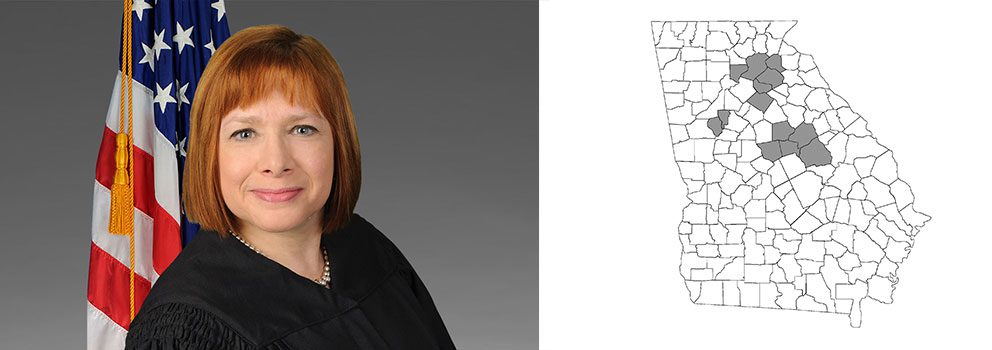
Appointed to the Court:
2006
Counties Covered:
Baldwin, Banks, Barrow, Clayton, Fayette, Forsyth, Hall, Hancock, Jackson, Jones, Putnam, Washington, and Walton
Education:
Bachelor of Science: Nursing – Louisiana State University Medical Center
Juris Doctorate (cum laude) – Loyola University School of Law
Hometown:
Arabi, Louisiana
A Nontraditional Legal Career Path
Growing up in the small town of Arabi, just outside of New Orleans, Judge Howells took a nontraditional career path to becoming a Judge on Georgia’s Administrative Court.
Judge Howells started her career in health care as a cardiac nurse after graduating from Louisiana State University Medical Center. According to Judge Howells, her tenure at the hospital was “pretty intense” and much like the TV drama shows. Although she enjoyed the autonomy and decision-making authority she had in the critical care unit, Judge Howells’ heart was always set on becoming an attorney.
At almost 30 years old, she decided to follow her dream and enrolled in Loyola University’s School of Law. “As a more mature student, I took law school very seriously and worked hard,” she said. While at Loyola, Judge Howells was a member of the esteemed Law Review and Moot Court. Judge Howells’ hard work paid off, as she graduated cum laude and immediately secured a position at Montgomery Barnett, a litigation firm in Louisiana.
Nursing Career Provides Competitive Legal Edge
Judge Howells’ prior career gave her a competitive edge at Montgomery Barnett, whose clients included a national medical device manufacturer. According to Judge Howells, her nursing background is like “being able to speak another language. I was able to speak with and understand the language of the medical experts, review medical records, and find important medically related information because of my nursing background.”
Judge Howells’ litigation and health care expertise next landed her a position with the prestigious international law firm Jones Day in Atlanta. There, she continued to litigate and provide legal counsel in the areas of products and medical liability, as well as toxic torts.
Making A “Real Impact” On The Bench
In 2006, Judge Howells brought her extensive litigation background and health care experience to the Administrative Court. Judge Howells said she enjoys being able to “make a real impact” on the parties who appear before her, and that she takes her role as a Judge very seriously. Her circuit currently includes the counties of Baldwin, Banks, Barrow, Clayton, Fayette, Forsyth, Hall, Hancock, Jackson, Jones, Putnam, Washington, and Walton.
One of the aspects Judge Howells enjoys most about her job is mentoring new Staff Attorneys and Judges. In addition to handling her own caseload, she also supervises Special Assistant Judges who work almost exclusively on child abuse registry cases.
A Straightforward Approach
Judge Howells takes a straightforward approach when deciding cases. She said, “I hear the facts and then figure out where they fall, in whose favor, and then apply the law to the facts.”
She also believes that the “ridiculous number of jobs” she had while growing up has given her incredible perspective when hearing and deciding cases. From serving nachos at the Louisiana Superdome, to selling shoes, to waitressing, to working in a darkroom at a camera shop, to working in hospitals, Judge Howells feels that her physically and emotionally challenging jobs gave her a “strong work ethic and perspective.” Further, these experiences have helped guide her in thoughtfully, fairly, and justly applying the law when deciding cases.
Advice On How To Prepare For A Hearing
Judge Howells’ advice to participants who are not legally represented when appearing before her is also straightforward. “Dress appropriately for court and be respectful to the opposing party,” she said. “If you dress appropriately for court, this tells me that you take the matter seriously.”
She has similar advice for attorneys appearing before her. According to Judge Howells, “Attorneys should be respectful to the opposing party. Nothing annoys Judges more than when lawyers are not civil – and quite frankly, we don’t need the theatrics.”
From The Courtroom To The Outdoors
When Judge Howells is not on the bench, she enjoys photographing wildlife. Her favorite spot to capture animals is in their natural environments, especially in national parks. “I love to take pictures anywhere there is wildlife. However, I am probably the worst wildlife photographer because I’m unwilling to get up early and sit out in the elements,” she said. Despite Judge Howells’ aversion to early mornings in nature, she did venture on a swamp tour back in her home state of Louisiana and captured an amazing still-life picture of an alligator, which you will find hanging on her office wall today.
12 Aug Administrative Court Hosts Georgia Department of Defense
In furtherance of its goal to remain knowledgeable about all aspects of Georgia life, the Administrative Court’s judicial staff recently met with Major General Thomas M. Carden, the Adjutant General of the Georgia Department of Defense, to discuss Georgia’s National Guard and its current initiatives.
In addition to an overview of the National Guard, Major General Carden discussed his responsibilities of directing, coordinating, organizing, and stationing more than 11,000 soldiers of the Georgia Army National Guard in order to ensure readiness for state and national missions.
“It was an honor and privilege to have Major General Thomas M. Carden share with us an overview of Georgia’s National Guard and provide us with valuable insights about our state’s military, which is always ready to serve and protect our citizens,” said Chief Judge Michael Malihi.
About the Court
The Office of State Administrative Hearings is the Administrative Court of Georgia, whose mission is to resolve disputes between the public and state agencies in a timely, impartial, courteous, and professional manner. Every year the Court oversees thousands of cases involving dozens of state agencies and hundreds of distinct issues. The Court’s Judges manage the highest caseload per judge in the nation and have the lowest cost per case in the nation.
